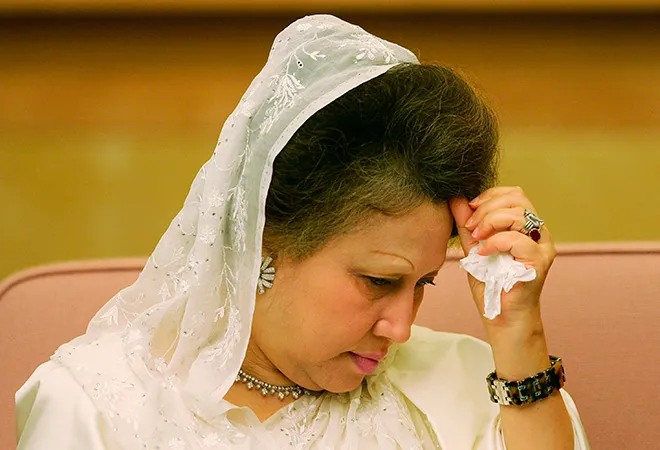-
CENTRES
Progammes & Centres
Location
Given the uncertainties, it is early to predict a future of Bangladesh politics, especially the path it takes after Khaleda Zia's release.

In a major turn to Bangladesh politics, opposition Bangladesh Nationalist Party (BNP) chairperson and two times prime minister, Begum Khaleda Zia was released from prison on 25 March. Begum Zia has been released after more than two years as she was serving a five-year prison term. She was jailed following her conviction in a case of financial misappropriation in a charitable organisation named after her husband and former military dictator General Ziaur Rahman. The decision to release Begum Zia for six months was taken on humanitarian grounds following outbreak of Covid19 pandemic. Begum Zia is 74 years old and is suffering from multiple chronic ailments like diabetes and arthritis. The Awami League government did not want to take chances considering her health condition. With the gesture, Prime Minister Sheikh Hasina, has gained some praise and people of Bangladesh have been appreciative of the government’s move. The present development has given rise to optimism about transformation in the country’s politics, which is largely confrontational.
For a long time, BNP was demanding Begum Zia’s release for medical treatment abroad. Earlier, petition to grant her bail was made before the court and the plea was rejected. The party appealed to the government for releasing her. Nevertheless, such efforts could not yield any outcome. Notably, her release is not without conditions and faces restrictions from travelling abroad. Begum Zia will be living in her residence in Dhaka and will be treated by Bangladeshi doctors. In times of the Covid19 pandemic, she will have to remain confined to her house and cannot go abroad due to the travel restrictions slammed by different countries to restrict spread of the virus.
Given the uncertainties, it is early to predict a future of Bangladesh politics, especially the path it takes after her release. Apparently, given the Awami League’s absolute majority in the parliament and the government having another three and half years to complete its term, there is no threat of instability for Awami League. Some fears have been expressed about the emergence of street protests, for which Bangladesh political parties are famous; however, with the outbreak of the pandemic such possibilities are bleak. Like rest of the world, Bangladesh is affected by the Covid19 pandemic and around five people have died already. The government has taken strict preventive measures and is emphasising on social distancing and encouraging people to stay at home. People have been conscious of the threat posed by the disease and taking these measures seriously. Hence, any major initiative by the BNP will hamper its credibility and the party would have factored these aspects into its consideration.
After democracy was re-established in Bangladesh in 1991, the BNP was in power twice (from 1991 to 1996 and from 2001 to 2006). The party is main rival of the Awami League and the two parties are always on loggerheads. The rivalry between the two parties often result in violent clashes amongst their cadres affecting law and order and result in political instability. Clashes ahead of the 2006 parliamentary elections is a glaring example due to which anarchy reigned and the elections had to be cancelled. The caretaker government appointed to supervise the election as per the existing law then, resigned, leading to a constitutional logjam. Emergency was declared to control the situation.
Off late, however, frequency of street protests has reduced significantly in the country. It will be early to draw a conclusion about change of political culture in the country. Some of the possible reason for BNP’s falling strength include
• Remaining out of power for a long time.
• Its decision of not participating in the 2014 parliamentary election has dented public confidence.
• Lack of leadership due to imprisonment of Khaleda Zia and the absence of her son Tarique Rahman from the country, who is considered as the successor to her political legacy.
Tarique Rahman, is living in London for more than a decade on health grounds. Release of Begum Zia has brought a fresh ray of hope for her party. The test lies ahead for the political party whether it can move above politics or stand by its countrymen in mitigating the risk of Covid19, the biggest threat in front of the humanity today.
Begum Khaleda Zia and Sheikh Hasina, famous as the battling begums of Bangladesh politics, could prove the term a misnomer and work together in fighting the crisis that humanity is facing today.
The views expressed above belong to the author(s). ORF research and analyses now available on Telegram! Click here to access our curated content — blogs, longforms and interviews.

Joyeeta Bhattacharjee (1975 2021) was Senior Fellow with ORF. She specialised in Indias neighbourhood policy the eastern arch: Bangladeshs domestic politics and foreign policy: border ...
Read More +